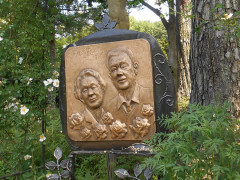English
Mr.Rose, Seizo Suzuki
Mr.Rose, Seizo Suzuki (1913-2000)
Seizo Suzuki opened a rose nursery in Tokyo when he was 24 years old. In 1958, he was invited into the Research Institute of Keisei Rose Nursery as its director. There he engaged in research of roses and in breeding new roses until he retired in 1993.
In an effort to create original new roses, he always strove for an effective breeding method fully based on scientific knowledge. He was particularly interested in the mechanism of biosynthesis of pigments and fragrances in rose flowers. Throughout his over 60 year breeding career, he raised as many as 129 new rose varieties, including 'Seika' ('Olympic Torch'; Gold Star of the South Pacific, New Zealand, 1972), 'Kampai' ('Cheers!', Grand Prize at Rome, 1982), and 'Kosai' ('Mikado', AARS, 1988).
While rigorously investigating the charms of roses through scientific methods, he also considered that an extensive knowledge of the history of roses and rose-related art is essential for breeders. The books he wrote, which reflect his far-reaching interest in the botanical, historical, and artistic study of roses, have had a strong influence on all rose lovers and breeders in Japan. The lectures he gave on TV gardening programmes also spread the joy of rose growing among Japanese gardeners.
He fully realised the importance of wild species and old garden roses in the early period of his career --in the 1960's, and established a great collection of heritage roses at the research institute of Keisei Rose Nursery. The number of rose varieties and species he collected supposedly reached almost 2,000. Mr. Peter Harkness, who saw the collection in 1993, wrote: "For quality of growth and richness of variety I have never seen its like. I could have stayed for days." (The Rose, RNRS, Christmas 1993). When Mr. Suzuki retired from the work of Keisei Rose Nursery, one of his disciples, Katsuhiko Maebara, took over part of this collection, which laid the basis for the collection of the City of Sakura Rose Garden (Kusabue-no-oka) today
